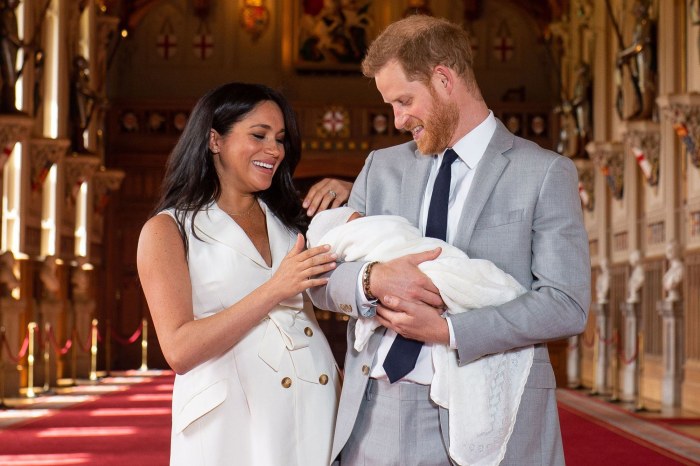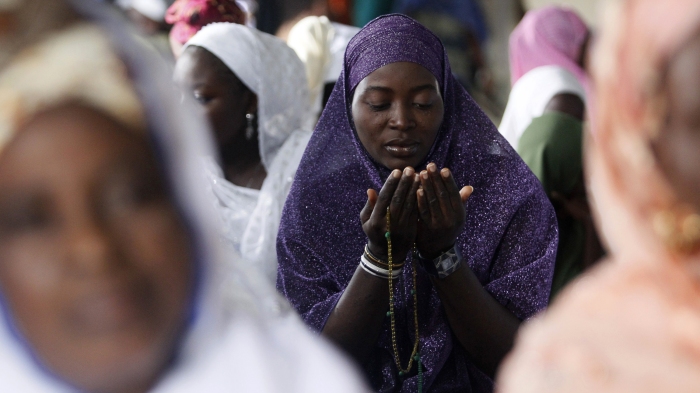Ramadan started brilliantly this year. The very first day of fasting say a new addition to the British Royal family, when Meghan Markle (the Duchess of Sussex and wife of Prince Harry) gave birth to a baby boy.
However, things started to deteriorate after this promising piece of glad tiding, as the usual news stories of car bombings and suicide attacks in various parts of the Muslim world started coming through, places such as Pakistan, Baghdad, and Syria. Feel free to also add Palestine, Kashmir, China, and Yemen to the list of terror and despair faced by Muslims across the world. Apologies, I forgot one more: please also include the sabre rattling currently being done by Trump and his administration over Iran, rattling that is backed weirdly by both Saudi Arabia and Israel, providing us with a real world example of the ancient proverb ‘the enemy of my enemy is my friend.’
And you also have issues of Ramadan excess. Whilst Ramadan is a month of restraint there are many Muslims who over indulge in their festivities. Ramadan is a month long practice intended to encourage us Muslims to reflect on our daily habits and spirituality through piety and self-discipline. However, the celebrations involved and how they are practiced in the modern era often lead to counter intuitive effects, such as significant weight gain and food waste This food waste can escalate due to a variety of factors ranging from a commercialisation of the holy month, to the generosity of hosts who overcook for events, and to over ordering in restaurants.
The excess problem is such that in Jakarta, capital city of the largest Muslim country in the world, Indonesia, local authorities had to deal with an additional 200 tonnes of waste during Ramadan last year. Over in the UAE, according to their Food Bank project, leftover food waste is expected to go up from an average of 2.7 kilograms per person daily to 4.5kg during Ramadan. The situation in Malaysia is similar, where wastage rises by a third from 15,000 tonnes per week to 20,000 tonnes during this month. Furthermore, a study by market research firm AMRB found that nearly twice as much time was spent cooking during Ramadan than at any other time of year and that there was a 43 per cent increase in the number of dishes prepared at home during the month.
These scenarios are likely to be replicated wherever Ramadan is being observed by a large Muslim population. It can easily be argued that this wastage is in significant contrast to the lessons of the prophet Muhammad who advocated breaking the fast simply with some dry dates and milk. Compare this to a Muslim community that focuses on serving elaborate meals to family and friends as they break their day’s fast. An admirable example of countering this wastage can be found in the UAE where the Ramadan Sharing Fridges scheme allows people to leave cooked food, fresh fruit and vegetables, and drinks, so those in need can help themselves. This beautiful example of a community sustaining itself and cutting back on waste is made even easier this year, all thanks to the ride-hailing app firm Careem who will even come and collect food from your door to deliver to the fridges.
Having said all that, this holy month is still considered a blessed time by Muslims all over the globe, who try to capture the true spirit of Islam throughout these 30 days. And since Ramadan is a tremendous reaffirmation of my Islamic faith, I thought it would be good to share the positive views of others who feel the same way. I will avoid quoting the likes of atheist astrophysicist Neil deGrasse Tyson, who recently tried to tell the Muslim world that they have been fasting incorrectly all this time (silly 2 billion Muslims!), and the likes of female Muslim comedian Sadia Azmat, who somewhat over shared in an article about her personal desires during Ramadan. Instead please find below selected quotes from recent articles that present a sincere and positive view of Islam, Muslims, and Ramadan. Enjoy!
The Islamic month of Ramadan is here, and I am excited by the calmness and reflection that this month brings. Ramadan, the ninth month on the Islamic calendar, is considered the holiest month for Muslims. It is a time where we fast, not just from eating food, but also from our worldly desires including things like shopping, or watching television — it’s a time very similar to that of Lent for Christians. This month is dedicated to feeding our souls through reading more, praying more, and being more patient and kind to everyone, while attaching ourselves more to God. It is a month that is dedicated to spiritually grooming yourself to be a better person for the rest of the year — contrary to the bigoted perceptions that exist against Muslims. – Imani Bashir
What I wish more people knew is that the practices and teachings of Islam are rooted in love. For many other Muslims and I, holding onto traditional practices in a society that is becoming more and more secular is important. Ramadan is a part of my culture, whether I’m feeling particularly close to Islam as a religion or not. Because of this, it has become something that grounds me each year. Fasting teaches Muslims self-discipline, patience, and the value of the things we take for granted every day. It’s a time period during which I tap into empathy, compassion, and ultimately how to value these concepts not just one month out of the year, but all the time. Each year, Ramadan seems to arrive when I least expect it, but also when I need its reminders and inspiration the most. Telling me to harness and redirect all the energy I aimlessly put into superficial and immediate gratification, into something greater than myself. Fasting teaches all Muslims restraint and self-discipline. It teaches me that Islam — like the moon when I search for it each night — will always be there. – Nadra Widatalla
Whether it’s in theatre, comedy, sports, music or politics, Muslims are challenging the traditional stereotypes and showing that they are, and want to be, a part of the mainstream community. That’s why I urge people, particularly during Ramadan, to find out more about Islam, increase your understanding and learning, even fast for a day with your Muslim neighbour and break your fast at the local mosque. I would be very surprised if you didn’t find that you share more in common than you thought. Muslims are at the heart of every aspect of society. Their contribution is something that all Londoners benefit from. Muslim police officers, doctors, scientists and teachers are an essential part of the fabric of London. There are valuable lessons that people of all backgrounds can learn from Islam such as the importance of community spirit, family ties, compassion and helping those less fortunate, all of which lie at the heart of the teachings of Ramadan. – Boris Johnson, May 2019, whilst on an official visit to the East London Mosque and London Muslim Centre
Ramadan is a time for contemplation, taking stock of our eating habits and giving to charity. In the western world, we have such an excess of food. We seem to have a culture of ‘living to eat rather than eating to live’. We are fortunate to have so much food at our disposal, whenever and wherever we need. But what about those people less fortunate than us? In many Muslim countries, come sunset when the fast breaks, mosques and restaurants open up their doors and feed the poor for free. I think that’s a wonderful way of giving back. – Parveen “The Spice Queen” Ashraf
The question I get asked most in Ramadan is, “You can’t drink even a sip of water?” People think that models don’t eat anyway, and so Ramadan should be easy, but that’s not true. For a start, you always end up putting on weight because your body craves heavy, greasy carbs at iftar and then you can’t move afterwards. My mum always says when we’re piling our plates up, “You won’t finish that!”…I look after my body and always eat while I’m on shoots, so this month will be a test, but the peace you feel during Ramadan is beautiful. It’s difficult to explain, because most people can’t get past the idea of no food or drink, but you gain so much spiritually. It’s a different, calmer perspective. You put yourself in the shoes of people who live this reality every day and it reminds you to be grateful and patient. – Asha Mohamud, British-Somali model
Ramadan is a time where we remember to give back and try and feel how it feels to be closer to God, and to remember all the blessings that we’ve been blessed with. It’s something that the Muslim community and individuals really look forward to. It’s something that comes from their heart. It’s a time when we find ourselves connecting with God more because we’re starving our bodies but we’re feeding our soul with God. – Haris Ansari
Western society could learn a lot about the struggles of others through the practice of Ramadan. We have a lot of ease in our society, a lot of comfort, but during Ramadan, people all around us are showing self-control and restraint and sacrifice when they practise their religion. It’s about being uncomfortable in your practice of faith, and there’s a lesson in that. During my research for the book, I was very surprised at the lack of science and studies about what fasting does physiologically to the body, especially considering how many people in the world are Muslim and adhere to Ramadan. – Brigid Delaney, author of Wellmania: Misadventures In The Search Of Wellness
Despite the exhortations about being more conscientious during Ramadan, the most shocking thing is that food waste actually rises during the holy month…We need to start recognising the dissonance between what we say Ramadan is, and what we actually do during those 30 days…Fundamentally, the answer is rooted in Ramadan traditions that already exist: share with those who really need the food. The increase in the amount given to charity during the month of fasting is testament to people’s generosity and open-heartedness. It’s also the key to re-thinking how we share our iftars. Instead of having excessive meals on our own, we can think about how to distribute it. – Shelina Janmohamed
This Ramadan, as grown-ups consciously slow down, turn inward and nurture their inner spirit, one of the important responsibilities is to also inculcate in children the true essence of Ramadan. The values of sharing, generosity and charity are as integral to adults as they are to children. In fact, the sooner children are taught these values, the better will they grow up into compassionate individuals. Like a muscle in the body that gets stronger through exercise, compassion too grows with every act done in its guiding spirit. – Jumana Khamis


